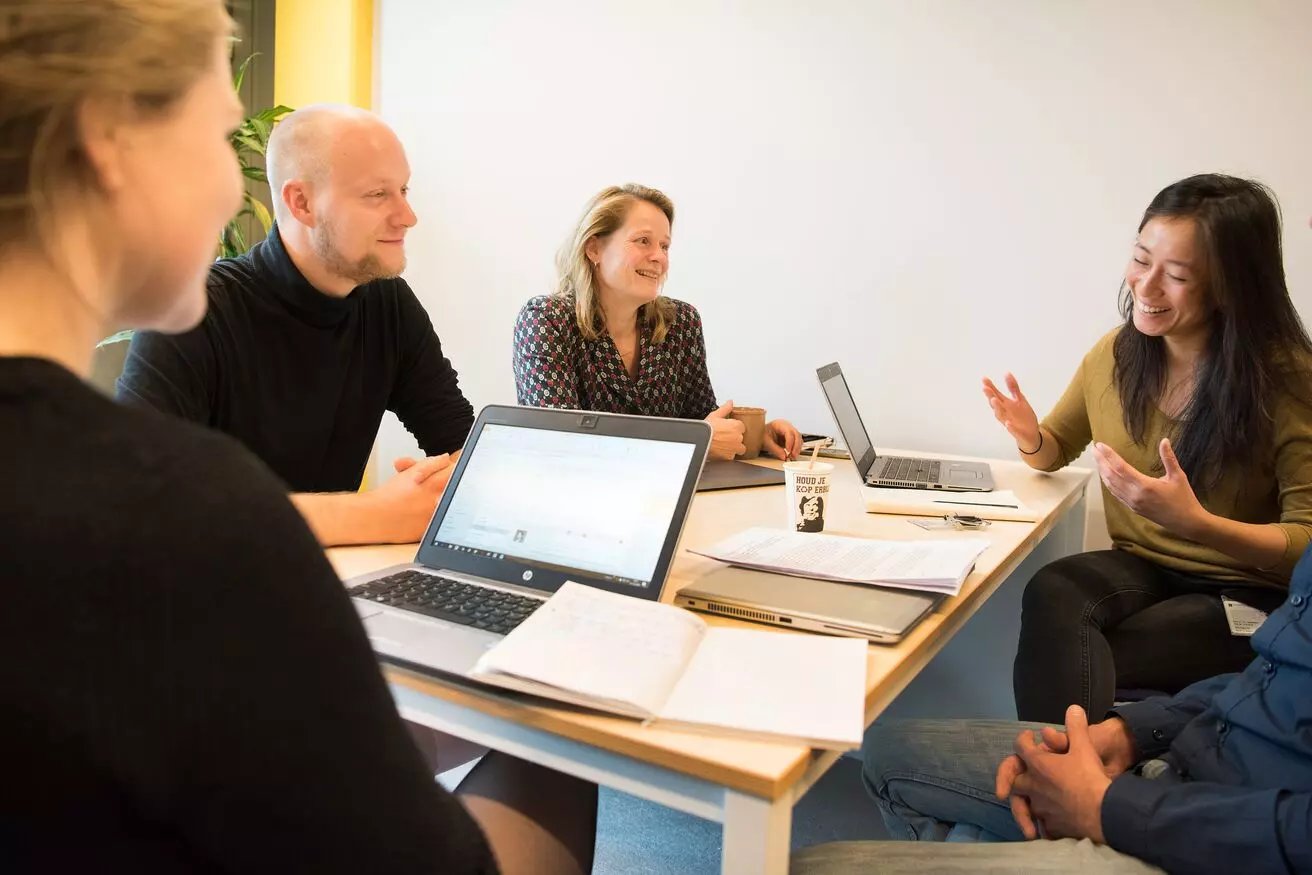This website uses cookies
We, and third parties, use cookies on our website. We use cookies to ensure that our website functions properly, to store your preferences, to gain insight into visitor behavior, but also for marketing and social media purposes (showing personalized advertisements). By clicking 'Accept', you agree to the use of all cookies. In our Cookie Statement. you can read more about the cookies we use and save or change your preferences. By clicking 'Refuse' you only agree to the use of functional cookies.
.jpg)
PhD Position on the Role of the Endocannabinoid System in Early Life Stress-induced Depression
- Faculty of Science
- 14373
- Master's
- €3.059 - €3.881
- 38 hours
- Closes on21-09-2025

PhD Position on the Role of the Endocannabinoid System in Early Life Stress-induced Depression
- Faculty of Science
- 14373
- Master's
- €3.059 - €3.881
- 38 hours
- Closes on21-09-2025
Working at the UvA
Join us!
We are looking for a highly qualified and motivated PhD candidate to conduct research activities aimed at unravelling the impact of (early-life) stress on the endocannabinoid system and its potential as target for intervention in the context of depression. This project has been funded by the NWO Gravitation project ‘Institute for Chemical Neuroscience (iCNS)’.
Neuropsychiatric disorders are highly prevalent and remain among the leading causes of global disease burden. However, developing effective therapeutics for these disorders is challenging, as the underlying molecular mechanisms driving neuropsychiatric symptoms are poorly understood.
Exposure to adversity early in life is one of the main risk factors for developing psychiatric disorders later in life including depression. There is increasing evidence that exposure to stress early in life (ES) lastingly affects neurobehavioral outcomes and increases vulnerability to develop psychopathology later in life. Despite major advances in the field concerning the neurobiological substrates underlying the ES-induced increased risks the underlying mechanisms remain not yet completely understood and often hard to target, rendering the development of effective interventions challenging. The endocannabinoid system (ECS) has been emerging as a crucial regulator of stress responses; its disruption has been associated with depressive behaviors and pharmacological interventions targeting ECS have shown therapeutic potential for treating depression and anxiety.
This PhD project aims to investigate the impact of (early-life) stress on the endocannabinoid system and its potential as target for intervention. We aim to visualize the endocannabinoid system using advanced chemical tools focusing not only on the expression but also the dynamic interaction of the key proteins for the endocannabinoid signalling and to target these systems in a cell-type specific manner to test whether their modulation might counteract the impact of ES.
This project is collaboration between the University of Amsterdam, Leiden University, University Medical Center Groningen and Erasmus MC. The position is embedded within The Brain Plasticity Group in the team of dr. Aniko Korosi and Prof. Paul Lucassen at the Swammerdam Institute for Life Sciences, University of Amsterdam (UvA).

Working at the UvA
Join us!
We are looking for a highly qualified and motivated PhD candidate to conduct research activities aimed at unravelling the impact of (early-life) stress on the endocannabinoid system and its potential as target for intervention in the context of depression. This project has been funded by the NWO Gravitation project ‘Institute for Chemical Neuroscience (iCNS)’.
Neuropsychiatric disorders are highly prevalent and remain among the leading causes of global disease burden. However, developing effective therapeutics for these disorders is challenging, as the underlying molecular mechanisms driving neuropsychiatric symptoms are poorly understood.
Exposure to adversity early in life is one of the main risk factors for developing psychiatric disorders later in life including depression. There is increasing evidence that exposure to stress early in life (ES) lastingly affects neurobehavioral outcomes and increases vulnerability to develop psychopathology later in life. Despite major advances in the field concerning the neurobiological substrates underlying the ES-induced increased risks the underlying mechanisms remain not yet completely understood and often hard to target, rendering the development of effective interventions challenging. The endocannabinoid system (ECS) has been emerging as a crucial regulator of stress responses; its disruption has been associated with depressive behaviors and pharmacological interventions targeting ECS have shown therapeutic potential for treating depression and anxiety.
This PhD project aims to investigate the impact of (early-life) stress on the endocannabinoid system and its potential as target for intervention. We aim to visualize the endocannabinoid system using advanced chemical tools focusing not only on the expression but also the dynamic interaction of the key proteins for the endocannabinoid signalling and to target these systems in a cell-type specific manner to test whether their modulation might counteract the impact of ES.
This project is collaboration between the University of Amsterdam, Leiden University, University Medical Center Groningen and Erasmus MC. The position is embedded within The Brain Plasticity Group in the team of dr. Aniko Korosi and Prof. Paul Lucassen at the Swammerdam Institute for Life Sciences, University of Amsterdam (UvA).
All about this vacancy
What are you going to do?
You will
- Characterize the impact of early-life stress on the molecular and (possibly) epigenetic profiling of key genes/proteins of the endocannabinoid system in neuronal and microglial populations in key brain regions.
- Apply state of the art activity-based probes for endocannabinoid signalling to visualize and study how ES impacts on the dynamics of endocannabinoid signalling in specific cell types and brain regions and how these relate to behavior.
- Test if targeting the enzymes that produce and inactivate endocannabinoids in a cell-type specific manner, using advanced chemical tools, is able to counteract the ELS-induced impact on behavior.
Tasks and responsibilities:
- complete and defend a PhD thesis within the official appointment duration of four years;
- gain knowledge of the field through literature survey, discussion with team members, and internal lab meetings;
- contribute to the design of experiments and perform experiments in the lab;
- perform preclinical mouse experiments in vivo and analyse and interpret results of the experiments;
- take a leading role in writing of manuscripts;
- be an active member of the research teams at both the Swammerdam Institute and Leiden University and present your results at (inter)national scientific meetings;
- participate in the Faculty of Science PhD training program;
- assist in teaching Bachelor and Master’s students;
- co-supervise and interact with junior scientists (technicians, MSc/BSc students).
What do you have to offer?
You are excited about science and have a particular interest in, and preferably proven knowledge of depression, stress or endocannabinoid system. You like a challenge and are not afraid of combining neurobiology and chemistry. You have good statistical skills and experience with analyzing big data (e.g. RNA-seq, spatial transcriptomics). You like to work in a diverse setting and communicate closely with a diverse and multidisciplinary team (i.e. neuroscientists, chemistry). You are a team player and a pleasant colleague who enjoys being part of an interdisciplinary group of scientists. Finally, you have good time management skills enabling you to meet the projects’ deadlines for finishing analyses, reports and other deliverables.
Your experience and profile
You have/are;
- a MSc degree in Biology, Neuroscience/(neuro-)immunology, or related fields;
- preferably experience with big data and omics analyses and coding (e.g. python, R);
- affinity and experience with performing animal experiments;
- experience with classical biological methods (e.g. dissections, immunohistochemistry, western blot, PCR, in vitro assays, cell type sorting);
- It is a plus if you have experience with endocannabinoid research
- good project and time management skills enabling you to meet project deadlines
- good analytical, writing and presenting skills;
- fluent in English, both written and spoken and the willingness to learn Dutch (in case not Dutch native speaker).
Our offer
A temporary contract for 38 hours per week for the duration of 4 years (the initial contract will be for a period of 18 months and after satisfactory evaluation it will be extended for a total duration of 4 years). The preferred starting date is 1 November 2025. This should lead to a dissertation (PhD thesis). We will draft an educational plan that includes attendance of courses and (international) meetings. We also expect you to assist in teaching undergraduates and master students.
Based on a full-time appointment (38 hours per week) the gross monthly salary will range from €3.059 in the first year to €3.881 (scale P) in the last year. This does not include 8% holiday allowance and 8,3% year-end allowance. The UFO profile PhD candidate applicable. The Collective Labour Agreement of Universities of the Netherlands is applicable.
Besides the salary and a vibrant and challenging environment at Science Park we offer you multiple fringe benefits:
- 232 holiday hours per year (based on fulltime);
- multiple courses to follow from our Teaching and Learning Centre;
- a complete educational program for PhD students;
- a pension at ABP for which UvA pays two third part of the contribution;
- the possibility to follow courses to learn Dutch;
- help with housing for a studio or small apartment when you’re moving from abroad.
Are you curious to read more about our extensive package of secondary employment benefits, take a look here.
All about this vacancy
What are you going to do?
You will
- Characterize the impact of early-life stress on the molecular and (possibly) epigenetic profiling of key genes/proteins of the endocannabinoid system in neuronal and microglial populations in key brain regions.
- Apply state of the art activity-based probes for endocannabinoid signalling to visualize and study how ES impacts on the dynamics of endocannabinoid signalling in specific cell types and brain regions and how these relate to behavior.
- Test if targeting the enzymes that produce and inactivate endocannabinoids in a cell-type specific manner, using advanced chemical tools, is able to counteract the ELS-induced impact on behavior.
Tasks and responsibilities:
- complete and defend a PhD thesis within the official appointment duration of four years;
- gain knowledge of the field through literature survey, discussion with team members, and internal lab meetings;
- contribute to the design of experiments and perform experiments in the lab;
- perform preclinical mouse experiments in vivo and analyse and interpret results of the experiments;
- take a leading role in writing of manuscripts;
- be an active member of the research teams at both the Swammerdam Institute and Leiden University and present your results at (inter)national scientific meetings;
- participate in the Faculty of Science PhD training program;
- assist in teaching Bachelor and Master’s students;
- co-supervise and interact with junior scientists (technicians, MSc/BSc students).
What do you have to offer?
You are excited about science and have a particular interest in, and preferably proven knowledge of depression, stress or endocannabinoid system. You like a challenge and are not afraid of combining neurobiology and chemistry. You have good statistical skills and experience with analyzing big data (e.g. RNA-seq, spatial transcriptomics). You like to work in a diverse setting and communicate closely with a diverse and multidisciplinary team (i.e. neuroscientists, chemistry). You are a team player and a pleasant colleague who enjoys being part of an interdisciplinary group of scientists. Finally, you have good time management skills enabling you to meet the projects’ deadlines for finishing analyses, reports and other deliverables.
Your experience and profile
You have/are;
- a MSc degree in Biology, Neuroscience/(neuro-)immunology, or related fields;
- preferably experience with big data and omics analyses and coding (e.g. python, R);
- affinity and experience with performing animal experiments;
- experience with classical biological methods (e.g. dissections, immunohistochemistry, western blot, PCR, in vitro assays, cell type sorting);
- It is a plus if you have experience with endocannabinoid research
- good project and time management skills enabling you to meet project deadlines
- good analytical, writing and presenting skills;
- fluent in English, both written and spoken and the willingness to learn Dutch (in case not Dutch native speaker).
Our offer
A temporary contract for 38 hours per week for the duration of 4 years (the initial contract will be for a period of 18 months and after satisfactory evaluation it will be extended for a total duration of 4 years). The preferred starting date is 1 November 2025. This should lead to a dissertation (PhD thesis). We will draft an educational plan that includes attendance of courses and (international) meetings. We also expect you to assist in teaching undergraduates and master students.
Based on a full-time appointment (38 hours per week) the gross monthly salary will range from €3.059 in the first year to €3.881 (scale P) in the last year. This does not include 8% holiday allowance and 8,3% year-end allowance. The UFO profile PhD candidate applicable. The Collective Labour Agreement of Universities of the Netherlands is applicable.
Besides the salary and a vibrant and challenging environment at Science Park we offer you multiple fringe benefits:
- 232 holiday hours per year (based on fulltime);
- multiple courses to follow from our Teaching and Learning Centre;
- a complete educational program for PhD students;
- a pension at ABP for which UvA pays two third part of the contribution;
- the possibility to follow courses to learn Dutch;
- help with housing for a studio or small apartment when you’re moving from abroad.
Are you curious to read more about our extensive package of secondary employment benefits, take a look here.
Your place at the UvA
Where you will work
The Swammerdam Institute for Life Sciences is one of the Faculty of Science’s largest institutes. Its approximately 240 scientists and staff members work in 19 research groups that perform excellent research centered on four themes: Neurosciences, Cell & Systems Biology, Microbiology and Green Life Sciences.
Within the Brain Plasticity group, we study how our brain adapts to changes in an (often challenging) environment. We try to understand how plasticity is 'programmed', and how external factors like (early life) stress, nutrition, drugs, exercise or enrichment) can modify plasticity, and what role it plays in cognition and disorders, like depression and dementia.
More about the UvA
Your place at the UvA
This is where you will be working
Where you will work
The Swammerdam Institute for Life Sciences is one of the Faculty of Science’s largest institutes. Its approximately 240 scientists and staff members work in 19 research groups that perform excellent research centered on four themes: Neurosciences, Cell & Systems Biology, Microbiology and Green Life Sciences.
Within the Brain Plasticity group, we study how our brain adapts to changes in an (often challenging) environment. We try to understand how plasticity is 'programmed', and how external factors like (early life) stress, nutrition, drugs, exercise or enrichment) can modify plasticity, and what role it plays in cognition and disorders, like depression and dementia.
More about the UvA
Important to know
Your application & contact
If you feel the profile fits you, and you are interested in the job, we look forward to receiving your application. We accept applications until and including 21 September 2025
Applications should include the following information (all files besides your cv should be submitted in one single pdf file):
- a detailed CV including the months (not just years) when referring to your education and work experience;
- a letter of motivation;
- the names and email addresses of two references who can provide letters of recommendation.
Only complete applications received within the response period via the link below will be considered. A knowledge security check can be part of the selection procedure (for details: national knowledge security guidelines). The interviews will be held in the first half of October 2025.
Do you have any questions or do you require additional information? Please contact:
- Dr. Aniko Korosi, [email protected]
Diversity, Equity & Inclusion
Important to know
Your application & contact
If you feel the profile fits you, and you are interested in the job, we look forward to receiving your application. We accept applications until and including 21 September 2025
Applications should include the following information (all files besides your cv should be submitted in one single pdf file):
- a detailed CV including the months (not just years) when referring to your education and work experience;
- a letter of motivation;
- the names and email addresses of two references who can provide letters of recommendation.
Only complete applications received within the response period via the link below will be considered. A knowledge security check can be part of the selection procedure (for details: national knowledge security guidelines). The interviews will be held in the first half of October 2025.
Do you have any questions or do you require additional information? Please contact:
- Dr. Aniko Korosi, [email protected]
Other interesting vacancies for you

PhD Position on Perceptual Foundation Models
- Faculty of Science
- €3.059 - €3.881
- Closes on10-10-2025
- Master's
- 38 hours

PhD Position on Mathematical Foundations for Explainable AI
- Faculty of Science
- €2.901 - €3.707
- Closes on13-10-2025
- Master's
- 38 hours

PhD Position on Royalist Radicalism and Parliamentary Democracy in Restoration France
- Faculty of Humanities
- €3.059 - €3.881
- Closes on17-10-2025
- Master's
- 38 hours
Other interesting vacancies for you
.jpg)
PhD Position on Perceptual Foundation Models
- Faculty of Science
- €3.059 - €3.881
- Closes on10-10-2025
- Master's
- 38 hours

PhD Position on Mathematical Foundations for Explainable AI
- Faculty of Science
- €2.901 - €3.707
- Closes on13-10-2025
- Master's
- 38 hours

PhD Position on Royalist Radicalism and Parliamentary Democracy in Restoration France
- Faculty of Humanities
- €3.059 - €3.881
- Closes on17-10-2025
- Master's
- 38 hours

Don't miss out on your dream job!

